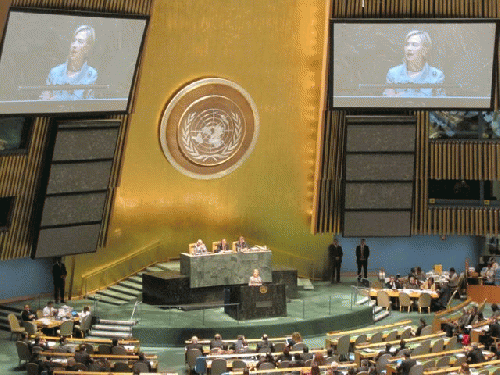By Diane Perlman, PhD
THE ONE AND ONLY THEORY Deterrence has not only been the dominant theory for nuclear policy but the only theory that has captured the political imagination for decades. We even call them "nuclear deterrents" not weapons.
Deterrence is designed to use threats of overwhelming violence to control a state's behavior. We believe we must be tough, strong and show resolve, to make the Other afraid. We dread weakness or "appeasement," fearing our own vulnerability. Giving up our "nuclear deterrent" feels like letting down our guard. Fear of giving up nukes is greater than of building more.
Deterrence has great appeal as the best way to prevent nuclear war. Based on deductive logic, it is impossible to prove deterrence is the reason for preventing aggression in any case. There may be other factors. Deterrence seems to work under some conditions and break down in others. It may humiliate and coerce actors into short-term submission only to blow up later like a political Columbine. We cannot prove whether it worked during the Cold War or whether it was "dumb luck" as Robert MacNamara claimed. It almost broke down several times.
To work, one has to have perfect knowledge of how the Other thinks and feels, and precisely what will deter them rather than provoke defiance or an impulsive reaction out of fear. With psychological ignorance of the Other's motives, intentions and attitudes, policy makers may misinterpret adversaries according to their own beliefs, which may bear no relationship to reality.
Even if we could claim that deterrence "worked" in a particular case 1 Deterrence does not address or correct underlying conflicts or improve relationships. 2 - It misses the chance to resolve conflicts, and spoils opportunities for exploring mutual interests and creative solutions, 3 It may seem to work in the short-term, but produce humiliation, defiance, instability, increase the popularity of hardliners, harm moderates and motivate asymmetric responses, and 4 Another approach might have worked better and improved relations.
If we believe deterrence is the only strategy to suppress an enemy's aggression, the thought of giving it up is frightening. We might cling to its illusory promise of security.
DEBATING THE WRONG QUESTION In "Deterrence Reconsidered: The Challenge of Research," Richard Ned Lebow notes that states don't always act according to theory. They may act either more cautiously or more risky than predicted. Critics of deterrence observe that ".. it can provoke the very behavior it seeks to prevent."
(Note: You can view every article as one long page if you sign up as an Advocate Member, or higher).





